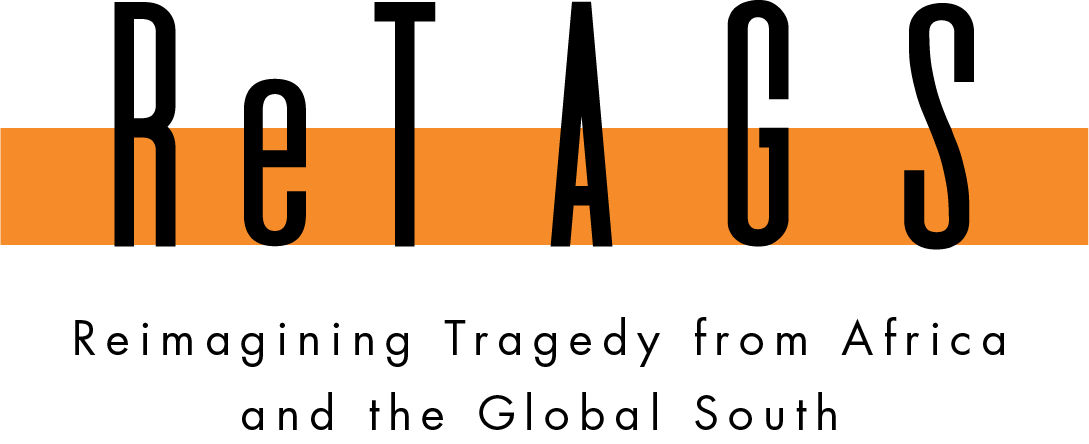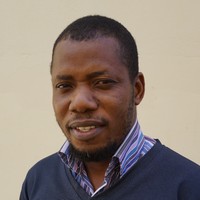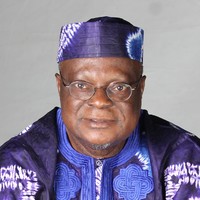Oral history interview with Olawale Lampejo
Title
Interviewee
Interviewer
Date Created
Recorded At
Duration
Capturer
Transcriber
Keywords
Language
Rights
Identifier
Olawale Lampejo
Olalekan Balogun
RETAGS
Saturday 15 February 2020
Transcribed by Olalekan Balogun
Balogun Okay, hmm, can I meet you?
Lampejo Good afternoon, my name is Olawale Lampejo. I am actor and a director. I have done some plays: African plays, European plays and I have directed a few, as an assistant director and as a director.
Balogun Okay, Wale Lampejo, let me give you a kind of brief background to this interview. This is part of the project entitled, RETAGS, which means Reimagining Tragedy in Africa and the Global South sponsored by the Andrew W Mellon Foundation and being led by Prof Mark Fleishman of the Centre for Theatre, Dance and Performance Studies (CTDPS) University of Cape Town, South Africa. Basically, the point of the entire project is to look at how that concept, Tragedy, has been reformulated, reimagined, refocused, reused, or whatever form of "re" that has prevailed, you know, I mean about that concept from the Greek tradition to our age, contemporary time, Nigeria and Africa and so on and so forth. So let's start like this, beyond the way Aristotle and the Greeks have presented the meaning of tragedy to us, how would you describe tragedy?
Lampejo Well, tragedy in our own world, this part of Africa is something we have always seen as something which occurs regularly within our people, and sometimes it's not totally tragedy.
Balogun What do you mean by that, you are still using that word?
Lampejo Yes we realise that…eh, there's always a comedic (comic) part of tragedy
Balogun Explain...
Lampejo Let me explain further that, even in tragedy we realise that there are some funny aspects that happen while we are mourning someone or something, some events that occur that will really...em...bring us to the realisation that its beyond tragedy and sometimes it becomes some funny aspects, let's put it that way.
Balogun Maybe what you're trying to say is that in some tragic situation we have some funny aspects of it. But, is it possible for us to imagine that when such situations occur and aspects of it tend to be funny, is it possible to imagine that something funny and painful are related?
Lampejo Yes, it's funny and it's painful at the same time. I think that's where the word, Tragicomedy, is formed. So we look at that aspect in bringing that into realisation whenever we want to stage our plays in order to make people understand that, even in some tragic situations, we still have some funny aspects.
Balogun So what you're saying is that in the context of Nigeria or any other part that you're talking about no situation is absolutely tragic?
Lampejo Not, not really. In or part of the world, we find something to...to get us out of that situation.
Balogun Like a kind of solace, to reduce the pang of the painful situation.
Lampejo Yes...
Balogun Okay, now let's bring it to the theatre. I have seen you a couple of times as an actor; seen you work on a couple of plays as a director, and have worked over time with a very good number of Nigerian actors and directors as an Assistant director. Now, over time and you've come across and worked on tragic plays especially the very popular Ola Rotimi's The Gods are not to blame, and Osofisan who happen to be perhaps the most distinguished adaptor and plays from other writers. You've worked on Osofisan, you've done Women of Owu...
Lampejo One Legend, Many Season...
Balogun One Legend, Many Season which happens to be an adaptation of Charles Dickens' A Christmas Carol and a whole lot of other ones. Now, let's look at it this way...let's take one of these plays, mainly the staging choices not necessarily the writing so that we can relate the experience of putting the play on stage in relation to that word that we target, that is tragedy, and perhaps as it has to do with these works. Let's look at One Legend, Many Season...which was staged at the National Theatre some years back.
Lampejo the National Play.
Balogun You said...?
Lampejo
Balogun Oh it was a National Troupe play...yeah, that was the time the National Troupe was doing the Season of Play...they've done Soyinka, J.P. Clark, I think it was when they were doing Osofisan season and directed by Ahmed Yerima, the artistic director of the National Troupe. Okay, what was your role in this play and how would you discuss that tragedy that Osofisan adapted?
Lampejo Yes, eh, like I said earlier the tragic aspect of it has been that...it moved from...let me just talk about the play.
Balogun Yes maybe that will help your memory.
Lampejo The main character goes around...trying to keep things for himself and, one way or the other, it started affecting everyone around him. But the tragic aspect of it is, that it came back to him...like all those things he was doing, like trying to isolate himself...
Balogun ...from people...
Lampejo Get everything for himself...spend everything...Christmas period...not showing love to anyone eventually came back to affect him. So he became a beggar, that's the tragic aspect of it because he almost lost everything.
Balogun Okay let's look at the staging choices...what are those elements that the director, Yerima, put into it, like music...what sort of music was used?
Lampejo We used different... African music, we used European music to blend the play, piano was used...you know...
Balogun These songs... were they composed by somebody who was part of the production or got from a repertory that has been in existence or something else?
Lampejo No, we made some of the songs...
Balogun So who composed them?
Lampejo The regular Christian songs were used...
Balogun Oh because the play was staged during Christmas...
Lampejo ...like the Christmas Carols, we used some of them. Some were composed by the head of music at the National Troupe of Nigeria.
Balogun Who was that...do you remember....I think one (Femi) Ogunrombi... or somebody?
Lampejo ...it's been a while...
Balogun Okay it's been a while...
Balogun Okay, lets come back to something that you did very recently...maybe like last year, or two years ago... which of these plays would you like to talk about?
Lampejo ...em, The Gods are not to blame
Balogun The Gods are not to blame...you were part of the play as what?
Lampejo As an actor and the assistant director.
Balogun Okay, that's very lovely. The Gods are not to blame...you know, so many of the people that I have interviewed talked about the play, of course it's a very significant play, very popular in Nigeria, in West Africa and so on and so forth. Now, let's look at it: what significant change do you think or was brought into the play apart from...you know...that actually stands the play out from the other ones that you have done in the past?
Lampejo Well, one thing that stood out was the storyline...
Balogun No, I am not talking about the story but the performance
Lampejo Okay?
Balogun Yeah
Lampejo Yes, eeh, while, we've seen the play so many times and it's like seeing the same thing over and over again, so we ask "what can we do?" So, we thought that we can start the play at the end.
Balogun Hm, okay, at the end?
Lampejo Yes, we picked some parts and merged it together to still give us the same result, so that is the...when people came in they were expecting...you know....from the beginning and how the story went but we have to bring it up from where...Odewale slept with the mother...you know...killed the father, then brought it back to where it started from.
Balogun Okay, in terms of the cultural content, what other changes were made to...you know...we know The Gods are not to blame is primarily set in an imaginary Yoruba community but the director made quite a number of changes such as in terms of the locality...maybe you might want to talk about that.
Lampejo Yes, we thought that...em...that the setting was in the past and we are in the present, so we thought lets think about it, let's assume that it happened in this recent...would it have gone the way as it did in the past. So we added this element to bring it into the Greek...I mean to this recent time.
Balogun Hm...so that obviously affected the choice of costume, props...and so on...
Lampejo Yes, we actually used recent costumes like...we used the normal shirt, the king didn't wear an agbada...only the crown symbolised that he was the king, and the chiefs also wore recent attires...the chiefs...what they wore in recent times not the olden days. Then, shoes they don't wear shoes in the olden days but we made sure that the Chiefs wore shoes. The beads...we made sure it was recent...they wore chains, all of which people found weird when they came in, but all of these is just...you know symbolises...it was like a symbolism, let me put it that way.
Balogun Okay, now we know that most African plays, especially tragedy, usually depend so much on music, what was it like, you know, putting this play together, what was the nature of the music?
Lampejo Yeah...it was a...it wasn't that easy because we had to blend those songs...you know, over the time that we had, over the time we had to create our own songs to fit into this recent time, so we made sure that it didn't really affect the story because songs actually speak...say a lot about the scenes...em that come into play. So we had to do a lot of work to make sure that it blends in and we are able to achieve traditional music with contemporary music...you know...to fit into the recent...
Balogun Okay, now what you're talking about is the process of putting the play together; let's look at you as an actor in that play. You played one of the elders...one of the chiefs, how would you assess your role in being an actor in that play in relation to what the story is saying about the society we live in?
Lampejo Well, the role I took in the play...I was the one who was asked to take the child away to be killed, and when they later found out that it didn't die, it was something that we couldn't face it. It was like we are the ones that the gods used to bring out the tragedy that were are talking about in the play.
Balogun Now, Wale let's look at that play, The Gods are not to blame, in the way you staged it in relation to tragedy in real-life, do you think the play actually reflected the tragedy that happens in real-life?
Lampejo Yes. I...I...
Balogun In what ways?
Lampejo Em...(silence) the way the play or the story rather had gone had been a way that....it's I wouldn't call it just a story but something that has been happening all around us. We see it day in, day out; but the only thing that I see is that the gods are brought into play here; most times we human beings are seen as small gods who actually make things happen, but we see the superior being who has said that it is destined to happen, so there's no way it can be averted. But, in our...in this current time, we have seen that this thing can happen and its between we, humans, and the...at play and we are actually the small gods. Let's assume, if I didn't say "take the baby away" it would not have happened, so I was the one who made that thing to happen. Which we see as...which some people see as being destined to happen.
Balogun That's quite interesting. So, you think often times fictional constructions like a play reflect the world in which we live?
Lampejo Yes, it does.
Balogun Hmm....that's an interesting one. Now if you look..consider The Gods are not to blame in relation to the other plays that you were in such as Efunsetan Aniwura which is a very tragic one in which you also played a very prominent role in terms acting and putting the play together, the production process, would you say the kind of tragedy that Efunsetan... dramatises is the same as the one that you have in The Gods are not to blame?
Lampejo No, it's different.
Balogun Okay how, in what context?
Lampejo The tragedy in TheGods are not to blame is something that has been predestined...
Balogun In terms of the storyline...
Lampejo Yes, in terms of the storyline. But, Efunsetan is...something that I will say...it was her handiwork, let me put it that way. She made it happen; there were no forces around which made...
Balogun Hmmm, can you just tell us...for the purpose of your audience or whoever will listen to this...just a summary of the story that Efunsetan dramatises?
Lampejo Hmm, she had different maids...
Balogun ....slaves
Lampejo Slaves I mean...
Balogun Efunsetan was a very powerful 19th century Yoruba Women leader...
Lampejo According to the rule she (gave) none of her slaves must be pregnant which happened...you know...and because of that...she came to know about it, and the elders and the brother came to beg her and she was adamant that she was going to kill them (her slaves). And...em...by taking...she was a dictator...
Balogun ...sort of...
Lampejo ...sort of. So after that...most times when you do that, people revolt. They come back to haunt you...right now, it's like pushing someone to the wall and the person turning back. I think it was her handiwork that actually brought about her own destruction..
Balogun But now Wale, let's look at this: Efunseta owned slaves that she maltreated; that's the real story. Now, Akinwunmi Isola dramatises the nature of that woman who takes advantage of powerless people, wrecks them, kills at will because she owns them. Isn't that a reflection of our world too, like we have politicians, influential and highly-placed people taking advantage of their people? Isn't that a reflection of the society that we live in beyond the 19th century that Akinwunmi Isola dramatises?
Lampejo It's actually the same thing but em...in this part of our world now especially Africa...military leaders...some do say the military leaders are just like Efunsetan, they are dictators and they kill at will. Nobody questions them. Where we talk about a democratic setting, the constitution is being made to suit them, to get away with all the things she did in the past. Because...em...most people are blind to it. They wouldn't see it that way...you know...
Balogun You mean the tragedy?
Lampejo Yes, the tragedy...they won't see it that way. I think eeh....Like when Saro Wiwa was killed, it was like taking the laws into their hands...you know...Europeans, the Super Powers...you know... pleaded with them but still went ahead...
Balogun ...that's Abacha?
Lampejo Abacha...and killed them. So its ..it's some form of tragedy because eh...these are renowned people...they have one way or the other done so much for the county. So I can relate them...Efunsetan and the dictators.
Balogun Okay...
Lampejo Efunsetan and the dictators...they are actually doing the same thing... something is backing them up.
Balogun Okay, Wale, what has actually changed in the way the Athenians, the Greek looked at tragedy and the way we look at it now, what has really changed in the perception about tragedy? In your own opinion, what has changed, or may be nothing has changed?
Lampejo Em...nothing has changed. Nothing has really changed...you know, there was a particular (phone rings) line in the play that I remember where...in this part of our world...we die for the king, it is called...em... suicide it is tragedy but when soldier are sent to fight and are being killed at war, they don't see it as suicide. So the way we see tragedy in our part and the way the European see tragedy is different. But really nothing has changed.
Balogun Okay, thank dso very much Wale, thank you for a wonderful insight, I think it was quite revealing...thank you.
Balogun turns off the audio recorder





